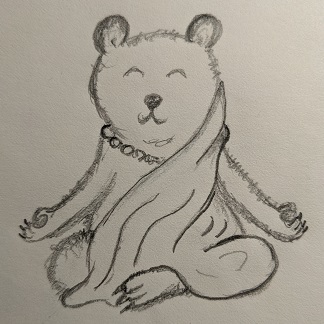On Mindfulness
In spiritual practice there is the concept of mindfulness, meaning awareness of the present moment and one’s thoughts, feelings, and bodily sensations in that moment, as they are being experienced. A goal of mindfulness is to achieve a calm acceptance of one’s circumstances, so that one is not living in a state of continuous mental and emotional turmoil.
A state of inner turmoil is sort of a baseline mode of operation for human beings. It comes about because of negative conditioning, which causes regrets about the past and anxiety about the future. This manifests as troubling thoughts and feelings which preoccupy one’s attention and take away one’s focus from the matter at hand, which only further complicates one’s existence.
I’m sure you are familiar with the experience, as well as with many pithy sayings that address the problem. “Don’t worry about what you can’t control, don’t hold on to the past,” and so forth. Easier said than done! Keeping one’s focus in the moment requires intention, even discipline. It actually takes an effort!
One suggestion is to practice meditation, which can be done by simply sitting calmly and putting one’s attention on one’s breathing. If you try this, you will find that thoughts pop up in your mind uninvited. Your mind is like a bubbling spring from which thoughts are constantly erupting.
When this happens while meditating, just let the thoughts go. Pay them no heed. They are just objects of experience – subtle mental objects as opposed to gross physical objects, and thus even less permanent. They dissipate like mist. Let them pass, and keep your attention on your breathing.
As you keep your attention focused, you will become aware of the stillness of the present moment. You will become aware of the inner light of consciousness, which is the ground of being. All of the objects of experience, which include your roiling thoughts, manifest within the field of consciouness.
Even time itself! It is true what they say, that all we have is Now. There is no reality to the Past or the Future, so how can they trouble you so?
If you learn to stay in the present moment, and not be distracted by worries about the past and the future, you will lead a fuller life. And you will be able to accomplish more.
The point isn’t to forget the past – it still has lessons to teach. Nor is it to forsake the future, and live as if there is no tomorrow. It is to be in the present, which after all is where we are.
Think of it in this practical sense: in order to ensure the safety and prosperity of yourself and your loved ones, you need to perform well at your job, yes? But if, as you do your job, you are only worrying about paying bills and planning the evening’s activities, you will hurt your productivity, right? At worse, this could lead to you losing your job, and how will you pay those bills then?
So mindfulness, if it keeps you rooted in the present, can benefit your future. That is the whole of it.
Mindfulness can help you navigate the troubled waters of times, even in times as troubling as these.

Behold!
The buddha bear is wise!